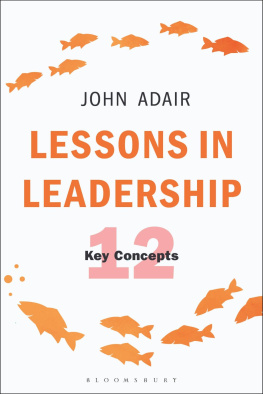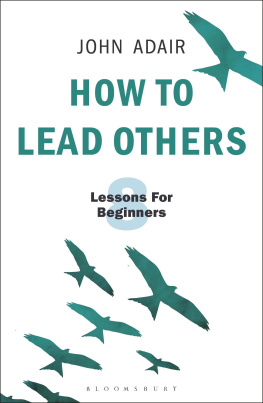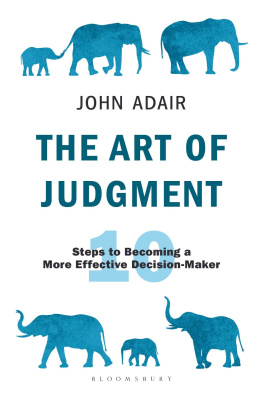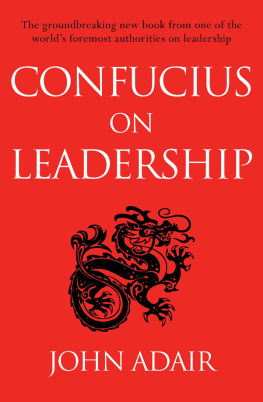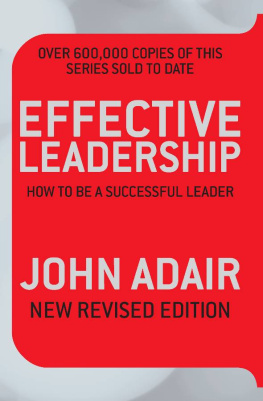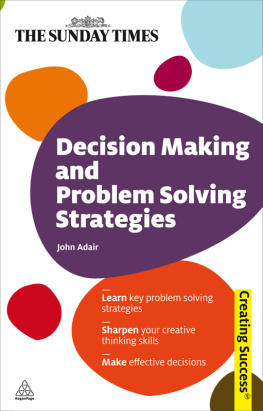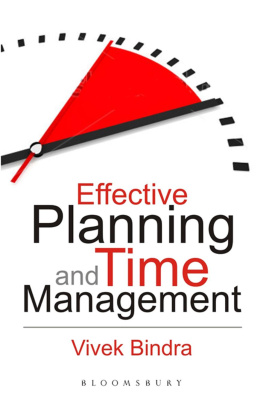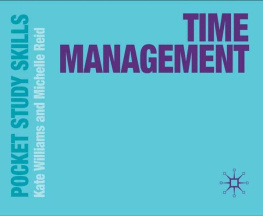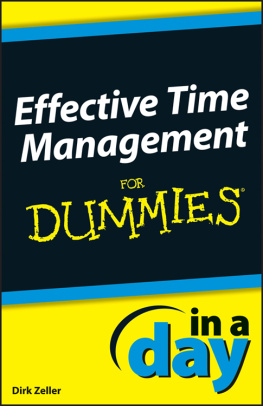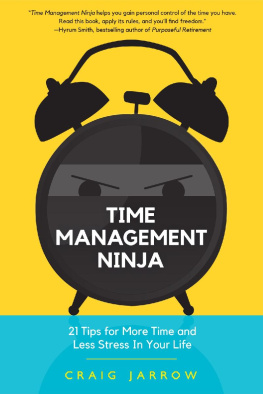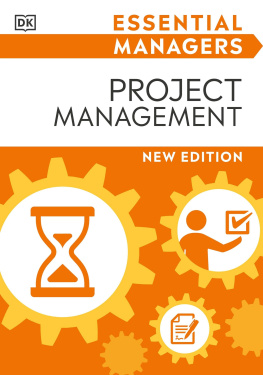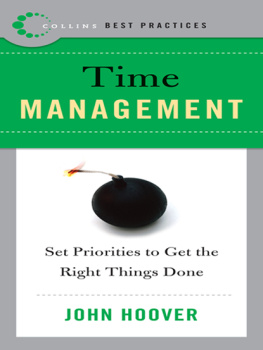EFFECTIVE TIME MANAGEMENT
HOW TO SAVE TIME AND SPEND IT WISELY
JOHN ADAIR
PAN BOOKS
CONTENTS
FOREWORD
Time wasted is existence, used is life.
Edward Young
Since this book was first published in 1987 under the title of How To Manage Your Time there has been an explosion of interest in time management. Google, for example, offers you around 130 million items under that heading. Just as we are suffering from information overload from the media and Internet, not to mention constant emails and often intrusive mobile telephone calls and texts, so we are being offered ever more advice often from very self-interested sources about how to solve all our problems of time.
Only someone with their head in the sand like an ostrich would deny that there are such time problems. Balancing all the real demands on your time, however skilled you are at multi-tasking, is not always easy. This is especially true if you are a single parent or part of a family where both partners work.
Technological innovations such as those mentioned above can of course save us time in a wonderful way. But they can also be time management minefields. There are people, for example, whose time is hopelessly fragmented by mindless responses to every email that comes across their screen. There are even addicts to mobile phones and texting who have forever lost complete solitude or time to think.
In fact your salvation doesnt lie in technology at all, not even in the original innovation of clocks and watches that are now quartz-accurate to the second. Technology makes a good servant to humanity but a very bad master. What gives us a degree of control over our time is a combination of reflective thinking and clear thinking. If you are willing to invest some time in those two activities, then you will, I trust, find this book to be a helpful guide and an encouraging companion.
You will notice that the book has a simple framework the Ten Principles of Time Management as summarized at the back. These are the fundamentals or basics of the subject, the ones that you need to graft into your mind, so that they are as much a part of you as the air that you breathe.
Some of the principles require reflective thinking on your part, especially those concerned with time and life. That leads on to reflections about your own values, the stars you steer your life by. Although we are hardly aware of it, these values are the major determinants in almost all our choices or decisions. How we spend our time is the expression of them.
Now it is impossible and unnecessary to be too precise about values, your own or other peoples, but you should at least have a good working knowledge of what is important or significant for you in life and what is not. Others may see it differently but you are you. Our first calling is always to be ourselves well, our best selves.
Reflective thinking will take you thus far but it wont take you all the way you also need to be able to think clearly about the daily tactics of time management. As I shall leave you to discover, most of the Ten Principles are really invitations to do some clear thinking about your purpose, aims and objectives, about what business you are in and what business you are not in, about the policies that can save you time in decision making when in repetitive situations. You will find, too, that I stress the importance of the skill of being able to make plans that are both definite and flexible. That is a necessary condition for being effective in any field of life.
May I add lastly my hope that you will find inspiration in these pages as well as principles, strategies, techniques, systems, rules of thumb and practical tips. For you will not become a master of your time overnight. It is a long journey, one with plenty of uphills and downhills, dark valleys and dry deserts. May this book be for you a well of continual inspiration, a source of hope and encouragement that will keep you ever moving forwards on the journey.
John Adair, 2009
The wood is lovely, dark and deep,
But I have promises to keep,
And miles to go before I sleep.
Robert Frost, US poet
1
TIME MANAGEMENT IN PERSPECTIVE
What is time? How did the concept of time management arise? What is the relation of time management to life as a whole?
These are not easy questions to answer. Possibly for that reason they are ignored by most other books on time management. Let us not make that mistake. For the attempt to view time management in its historical perspective may yield some important insights.
This chapter invites you to identify your assumptions about time management. How far are they your beliefs, consciously adopted and held? You may find that some of them are more or less unconscious assumptions, picked up from our common history and culture. For we inherit a tradition. It helps if we understand that tradition and build upon the foundations.
THE NATURE OF TIME
A sense of time as transitory is deeply human. As far as we know animals do not experience it. Tempus fugit time flies is a universal refrain. But what is time? Ancient philosophers were as much puzzled as we are:
For what is Time? Who is able easily and briefly to explain it? Who is able so much as to comprehend it in thought as to express himself concerning it? And yet what in our usual discourse do we more familiarly and knowingly make more mention of than Time? And surely we understand it well enough when we speak of it; we understand it also when in speaking with another we hear it named. What then is Time? If nobody asks me I know; but if I wanted to explain it to someone that should ask me, plainly I do not know.
St. Augustine, philosopher and theologian (354430)
In terms of our definition of time, things have not changed much since St. Augustine wrote those words. We all know what we mean by time but we cannot say what it is. Philosophers and physicists are less sure, for their speculations and calculations have not yet thrown more light on the matter.
If you are travelling at a speed faster than another person, time will go slower for you. If you flew around the world at 500 miles per hour with an atomic clock on the seat beside you, when you returned to where you started your clock would be about one hundredth of a millionth of a second slower than its twin on the ground.
Albert Einsteins discovery of this relativity provoked much thought about the relations of the dimensions of time and space. At very great speeds time does go slower. For general or everyday purposes, however, Einsteins discovery adds nothing to our understanding of time, for we dont travel at the kind of speed he had in mind. But Einstein has added to the mystery of time.
The nearest we can come to grasping the concept of time is to look upon it as a dimension, like space: it is the dimension in which change happens. The rate of change varies enormously: mountains form and crumble over millions of years while men are born and die over decades. Being human we tend to measure time and change in terms of our life span.
Although we know that each hour has sixty minutes and each minute sixty seconds we experience time in different ways. Sometimes we are not aware of it at all. Sometimes it goes faster and sometimes slower. Time has its own psychology.
No young man believes he shall ever die, wrote the literary critic and philosopher William Hazlitt. There is a feeling of eternity in youth; perhaps the young are prodigal with time because they feel they have so much of it. Yet boredom, not knowing what to do with time, can be the other side of the coin.
As we advance in life we acquire a keener sense of the value of time. For some people nothing else seems of any consequence; and in this respect they become misers. But for others time can again hang heavy. For a very old person sitting in hospital waiting to go home time can seem like eternity. Yet for such a person, paradoxically, there may be only days or hours of time left.


